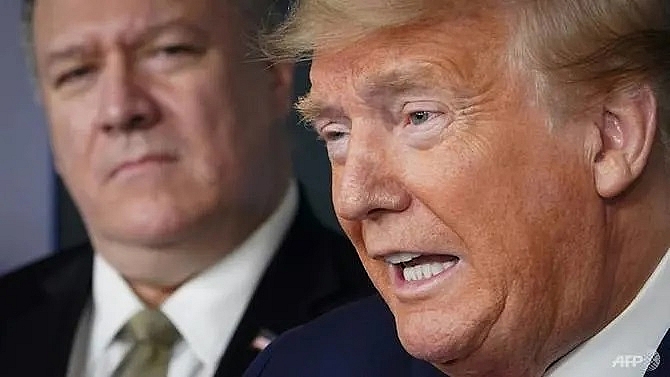Pompeo says Trump to act on Chinese students
 |
| US Secretary of State Mike Pompeo listens as US President Donald Trump speaks on the novel coronavirus at an April 2020 press conference at the White House. (File photo: AFP/MANDEL NGAN) |
Trump earlier said that he will hold a press conference Friday about China amid soaring tensions between the two powers, including over the status of Hong Kong and the COVID-19 pandemic.
Asked about a report in The New York Times that Trump was considering throwing out thousands of graduate students, Pompeo said that Chinese students "shouldn't be here in our schools spying".
"We know we have this challenge. President Trump, I am confident, is going to take that on," Pompeo told Fox News, while declining to say if action would be announced on Friday.
"We have an obligation – a duty – to make sure that students that are coming here to study ... aren't acting on behalf of the Chinese Communist Party," Pompeo said.
The New York Times said that the Trump administration was considering annulling visas for thousands of graduate students linked to China's military.
The move would be certain to draw criticism from universities, which rely increasingly on tuition from foreign students – of which China and India are the largest sources – and have already been hit hard by the COVID-19 shutdown.
Asian American activists have long voiced concern that the targeting of Chinese students impacts their own community, with US citizens of Asian ancestry coming under unjustified suspicion.
"This isn't a red scare, this isn't racist. Chinese people are a great people," Pompeo said when asked about the concerns.
"This is like the days of the Soviet Union. This is a communist, tyrannical regime that poses real risk to the United States," he said.
Trump, in remarks to reporters, declined to preview the press conference on Friday but said, "We're not happy with China."
The press conference will come two days after Pompeo certified to Congress that Hong Kong was no longer autonomous from China, as promised by Beijing before Britain handed over its colony in 1997.
China has been pressing forward the drafting of a security law that Hong Kong activists say will end freedoms enjoyed in the financial capital, which was rocked by months of pro-democracy protests last year.
Washington and Beijing are already clashing over responsibility for the extent of the coronavirus pandemic, which originated in China but has spread worldwide and caused devastation in the US.
Domestic critics accuse Trump of mismanagement and say that the 100,000 US deaths and massive unemployment were the result of a slow, patchy federal response to the virus' spread across the world's biggest economy.
But Trump blames the crisis on China and for a long time insisted on calling the COVID-19 sickness the "Chinese virus". He has threatened to cut off US funding for the World Health Organization, accusing the UN body of bias toward Beijing and assisting in a cover-up.
What the stars mean:
★ Poor ★ ★ Promising ★★★ Good ★★★★ Very good ★★★★★ Exceptional
Related Contents
Latest News
More News
- Russian President congratulates Vietnamese Party leader during phone talks (January 25, 2026 | 09:58)
- Worldwide congratulations underscore confidence in Vietnam’s 14th Party Congress (January 23, 2026 | 09:02)
- Political parties, organisations, int’l friends send congratulations to 14th National Party Congress (January 22, 2026 | 09:33)
- 14th National Party Congress: Japanese media highlight Vietnam’s growth targets (January 21, 2026 | 09:46)
- 14th National Party Congress: Driving force for Vietnam to continue renewal, innovation, breakthroughs (January 21, 2026 | 09:42)
- Vietnam remains spiritual support for progressive forces: Colombian party leader (January 21, 2026 | 08:00)
- Int'l media provides large coverage of 14th National Party Congress's first working day (January 20, 2026 | 09:09)
- Vietnamese firms win top honours at ASEAN Digital Awards (January 16, 2026 | 16:45)
- ASEAN Digital Ministers' Meeting opens in Hanoi (January 15, 2026 | 15:33)
- ASEAN economies move up the global chip value chain (December 09, 2025 | 13:32)

 Tag:
Tag:




















 Mobile Version
Mobile Version